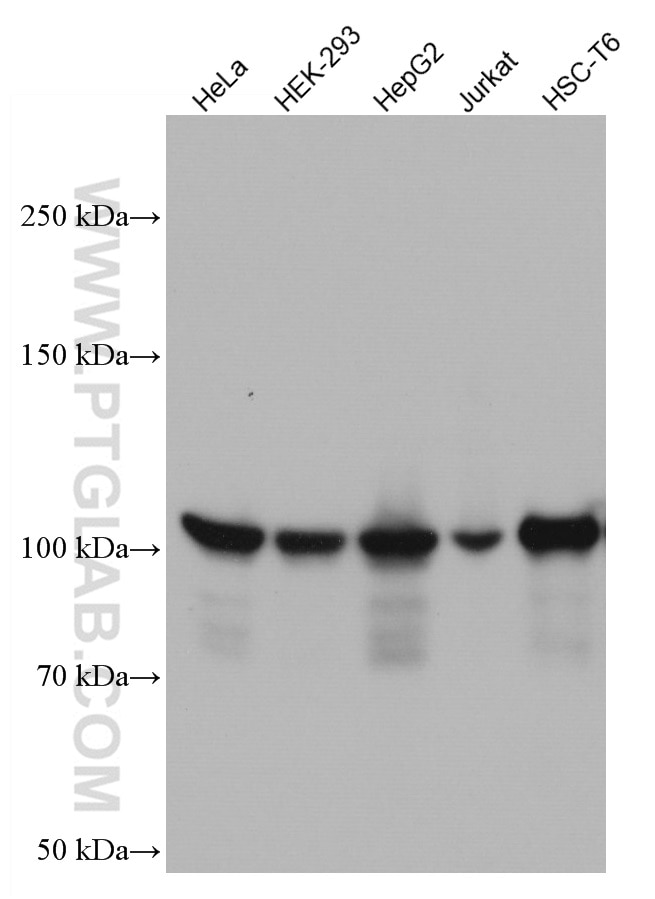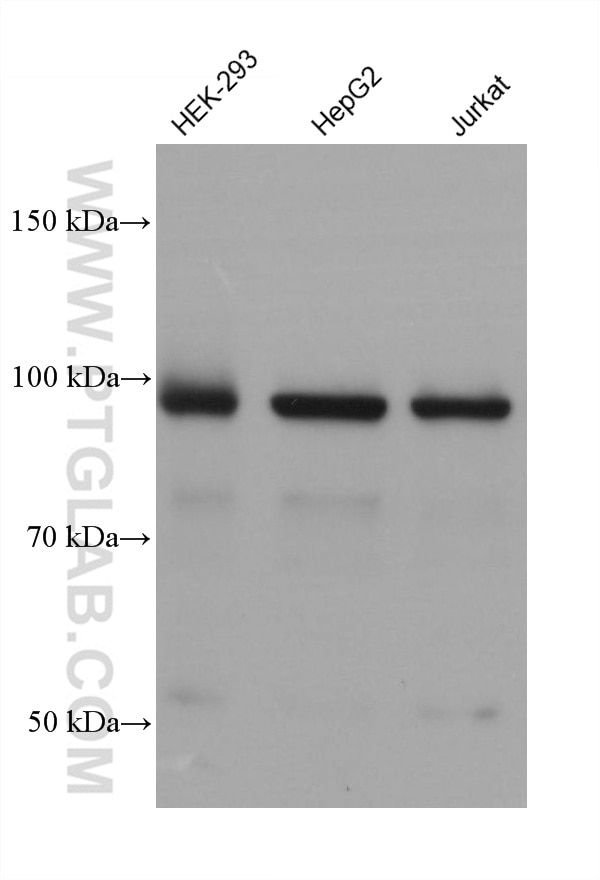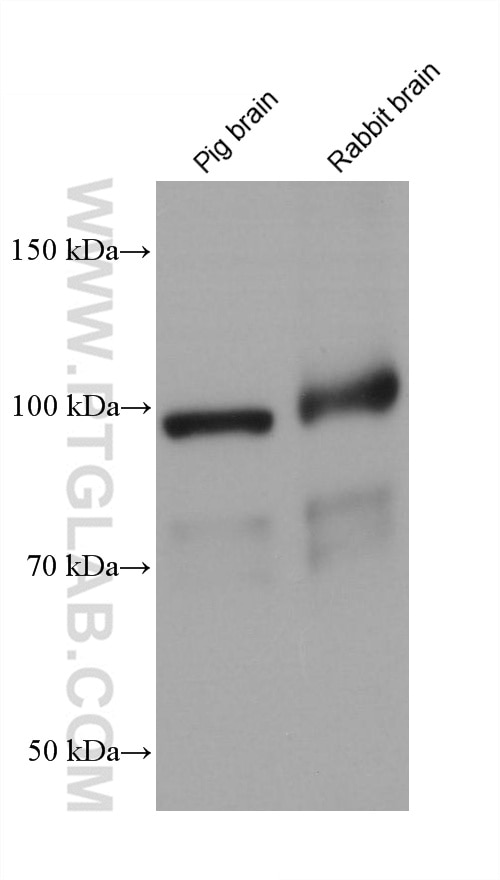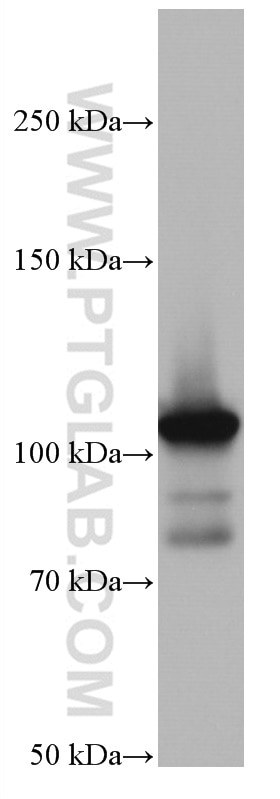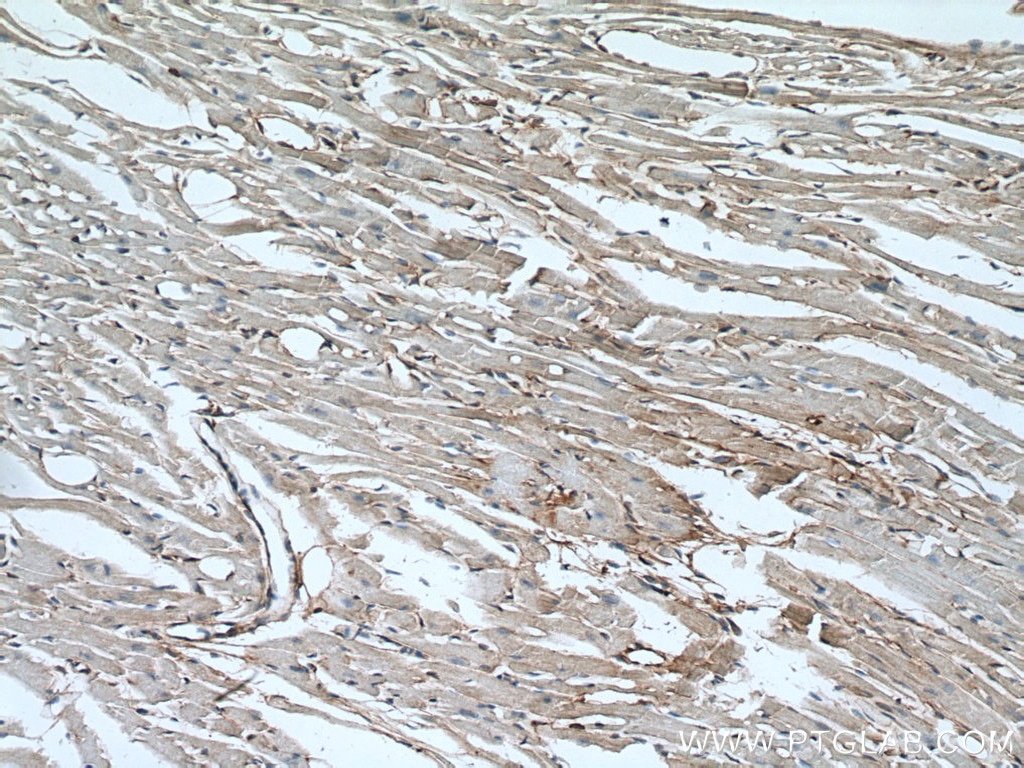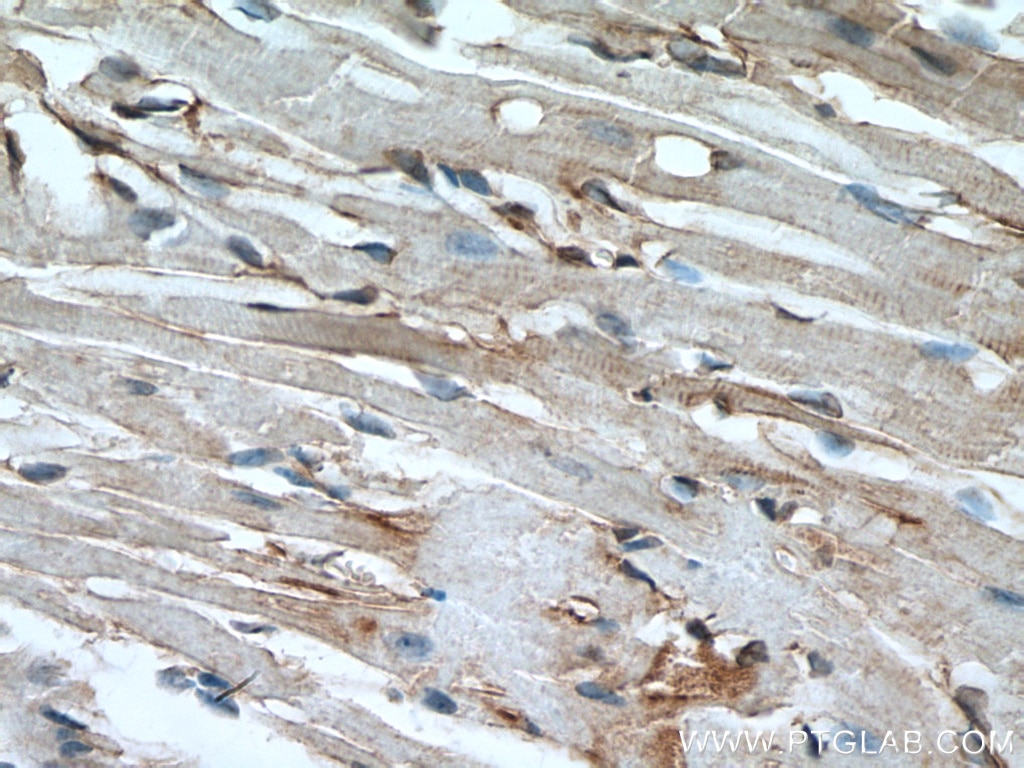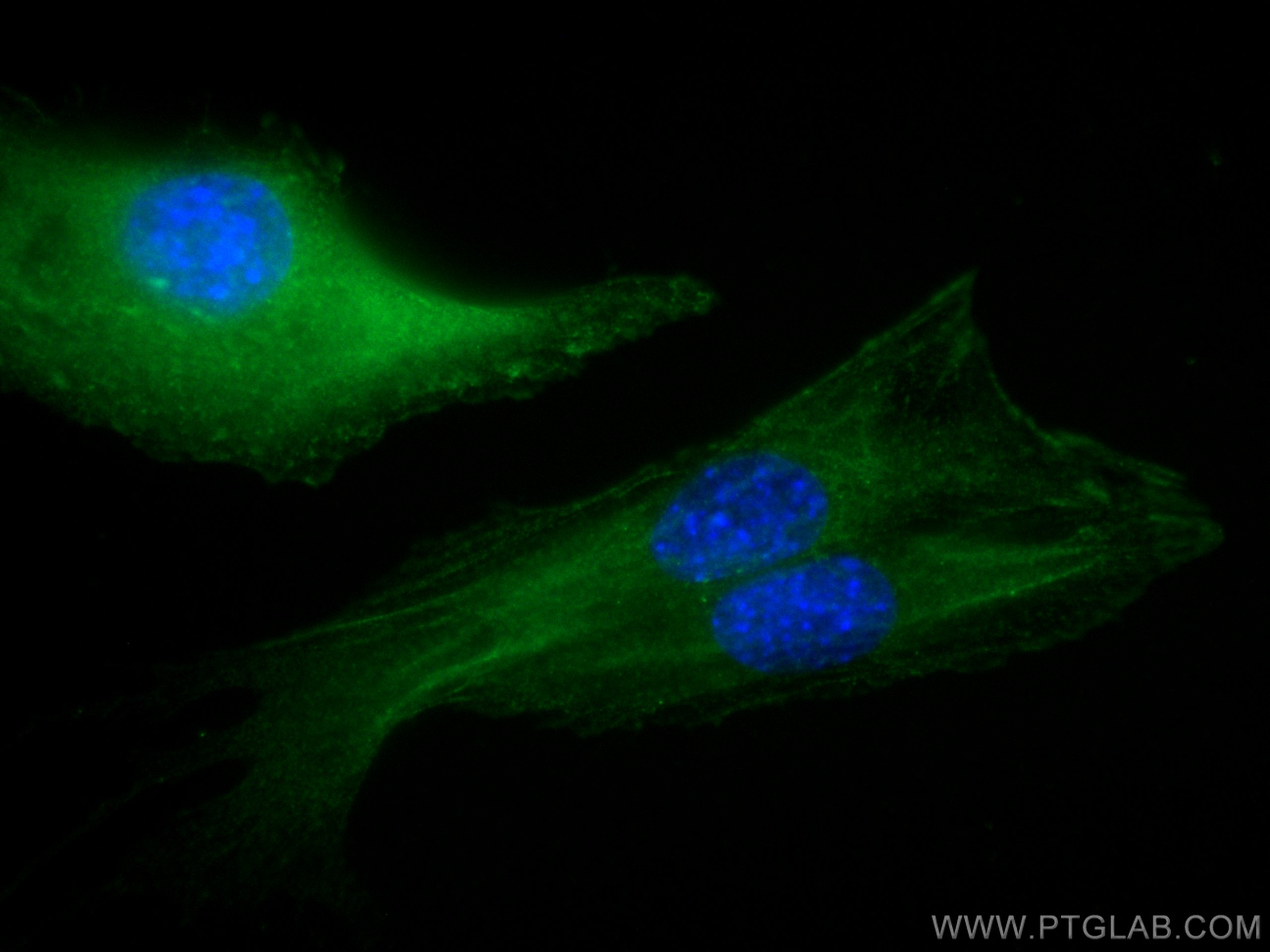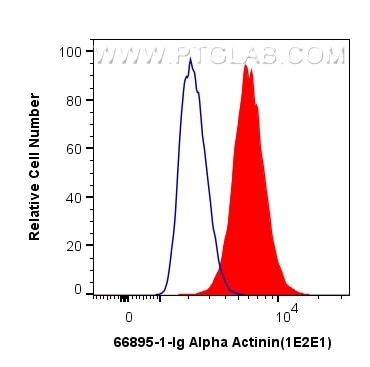Tested Applications
| Positive WB detected in | HeLa cells, RAW 264.7 cells, HEK-293 cells, pig brain tissue, HepG2 cells, Jurkat cells, HSC-T6 cells, rabbit brain tissue |
| Positive IHC detected in | mouse heart tissue Note: suggested antigen retrieval with TE buffer pH 9.0; (*) Alternatively, antigen retrieval may be performed with citrate buffer pH 6.0 |
| Positive IF/ICC detected in | C2C12 cells |
| Positive FC (Intra) detected in | A431 cells |
Recommended dilution
| Application | Dilution |
|---|---|
| Western Blot (WB) | WB : 1:5000-1:50000 |
| Immunohistochemistry (IHC) | IHC : 1:500-1:2000 |
| Immunofluorescence (IF)/ICC | IF/ICC : 1:200-1:800 |
| Flow Cytometry (FC) (INTRA) | FC (INTRA) : 0.40 ug per 10^6 cells in a 100 µl suspension |
| It is recommended that this reagent should be titrated in each testing system to obtain optimal results. | |
| Sample-dependent, Check data in validation data gallery. | |
Published Applications
| WB | See 5 publications below |
| IF | See 3 publications below |
Product Information
66895-1-Ig targets Alpha Actinin in WB, IHC, IF/ICC, FC (Intra), ELISA applications and shows reactivity with human, mouse, rat, pig, rabbit samples.
| Tested Reactivity | human, mouse, rat, pig, rabbit |
| Cited Reactivity | human, mouse, rat, mosquito |
| Host / Isotype | Mouse / IgG2b |
| Class | Monoclonal |
| Type | Antibody |
| Immunogen |
CatNo: Ag28383 Product name: Recombinant human a-Actinin protein Source: e coli.-derived, PET28a Tag: 6*His Domain: 543-892 aa of BC015766 Sequence: EIQGLTTAHEQFKATLPDADKERLAILGIHNEVSKIVQTYHVNMAGTNPYTTITPQEINGKWDHVRQLVPRRDQALTEEHARQQHNERLRKQFGAQANVIGPWIQTKMEEIGRISIEMHGTLEDQLSHLRQYEKSIVNYKPKIDQLEGDHQLIQEALIFDNKHTNYTMEHIRVGWEQLLTTIARTINEVENQILTRDAKGISQEQMNEFRASFNHFDRDHSGTLGPEEFKACLISLGYDIGNDPQGEAEFARIMSIVDPNRLGVVTFQAFIDFMSRETADTDTADQVMASFKILAGDKNYITMDELRRELPPDQAEYCIARMAPYTGPDSVPGALDYMSFSTALYGESDL Predict reactive species |
| Full Name | actinin, alpha 1 |
| Calculated Molecular Weight | 103 kDa |
| Observed Molecular Weight | 100-105 kDa |
| GenBank Accession Number | BC015766 |
| Gene Symbol | Alpha Actinin |
| Gene ID (NCBI) | 87 |
| RRID | AB_2882224 |
| Conjugate | Unconjugated |
| Form | Liquid |
| Purification Method | Protein A purification |
| UNIPROT ID | P12814 |
| Storage Buffer | PBS with 0.02% sodium azide and 50% glycerol, pH 7.3. |
| Storage Conditions | Store at -20°C. Stable for one year after shipment. Aliquoting is unnecessary for -20oC storage. 20ul sizes contain 0.1% BSA. |
Background Information
Alpha Actinins are highly conserved actin-binding proteins that form antiparallel homodimers with the actin-binding domains on each end of the molecule, allowing crosslinking of actin molecules. There are four alpha actinin isoforms identified: two ubiquitously expressed cytoskeletal isoforms (ACTN1 and ACTN4) and two striated muscle-specific sarcomeric isoforms (ACTN2 and ACTN3). ACTN1 is also alternatively spliced to form smooth muscle or brain specific isoforms. This antibody recognize endogenous ACTN1, while it may cross-react with ACTN2 and ACTN4.
Protocols
| Product Specific Protocols | |
|---|---|
| FC protocol for Alpha Actinin antibody 66895-1-Ig | Download protocol |
| IF protocol for Alpha Actinin antibody 66895-1-Ig | Download protocol |
| IHC protocol for Alpha Actinin antibody 66895-1-Ig | Download protocol |
| WB protocol for Alpha Actinin antibody 66895-1-Ig | Download protocol |
| Standard Protocols | |
|---|---|
| Click here to view our Standard Protocols |
Publications
| Species | Application | Title |
|---|---|---|
Cell Mol Life Sci SGK3 deficiency in macrophages suppresses angiotensin II-induced cardiac remodeling via regulating Ndufa13-mediated mitochondrial oxidative stress | ||
Cell Signal Interplay between autophagy and Sindbis virus in cells derived from key arbovirus vectors, Aedes albopictus and Aedes aegypti mosquitoes | ||
Arch Pharm (Weinheim) Design, synthesis, and biological evaluation of naphthalene imidazo[1,2-b]pyridazine hybrid derivatives as VEGFR selective inhibitors | ||
J Med Chem Machine-Learning-Driven Discovery of N-Phenylbenzenesulfonamides as a Novel Chemotype for Lactate Dehydrogenase A Inhibition with Anti-Pancreatic Cancer Activity | ||
Front Pharmacol Chronic Administration of COVID-19 Drugs Fluvoxamine and Lopinavir Shortens Action Potential Duration by Inhibiting the Human Ether-à-go-go-Related Gene and Cav1.2 | ||
Cell Mol Biol Lett APOE2 protects against Aβ pathology by improving neuronal mitochondrial function through ERRα signaling |

